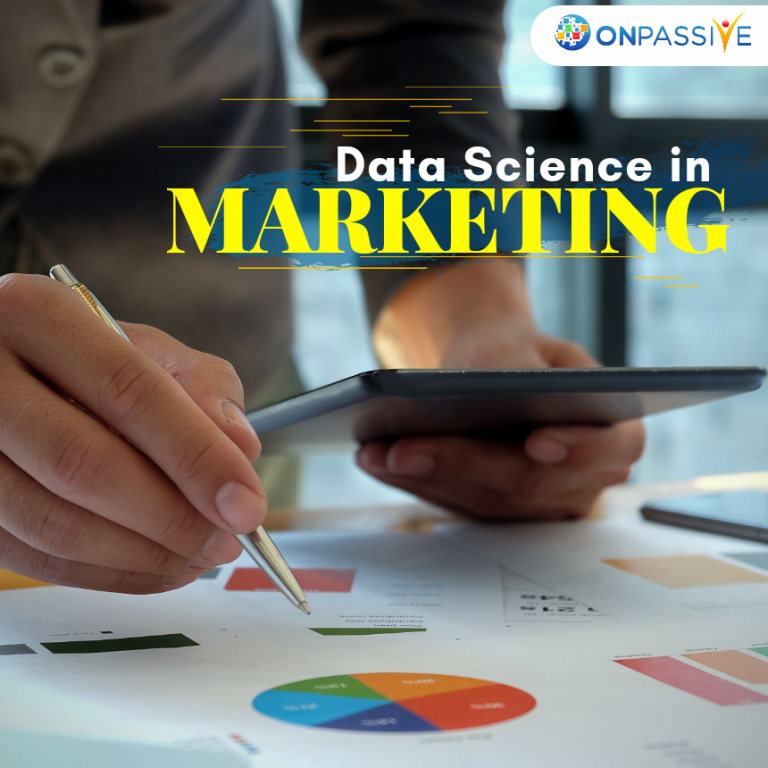
In recent years, online information intake has considerably shot up due to the extensive affordability of the World Wide Web. It is calculated that there are more than 6 billion devices connected to the internet right now. Approximately over 2.5 million terabytes of data are produced every single day. For, every individual person, there will be 1.7 MB of data generated every second.
For marketers, this massive amount of data is as good as a gold deposit. If this data can be accurately analyzed and processed, it can produce precious insights which marketers can utilize to target consumers. Still, decoding enormous chunks of data is a gigantic task. This is where Data Science can help immensely.
Data Science in marketing helps marketers obtain significant knowledge from data and assists them in determining the right insights. These insights can be on several marketing aspects such as customer behaviour, intent, experience, etc. that would support them in effectively optimizing their marketing approaches and acquire maximum revenue.
Related: 4 Secrets to Use AI for Lead Generation, Qualification, and Conversion
Let’s look into 7 ways in which Data Science can be executed in Marketing:
Marketing Budget Optimization
Marketers are constantly under a strict budget. The principal goal of each marketer is to obtain maximum ROI from their allocated budgets. Accomplishing this is ever time-consuming and tricky. Things don’t always work as per plan, and effective budget utilization is not always achieved.
By analyzing acquisition data and marketer’s spend, a data scientist can develop a spending pattern that can help utilize the budget adequately. The model can help marketers allocate their budget across channels, mediums, locations, and campaigns to optimize for their essential metrics.
Related: Secrets To Improve Your Content Strategy with Data
Marketing to the Right Audience
Usually, marketing campaigns are broadly shared irrespective of the audience and location. As a result, there are great chances for marketers to exceed their budget. They also might be unable to accomplish any of their revenue and goals targets.
However, if they utilize data science to interpret their data accurately, they will be capable of understanding which demographics and locations are giving them the highest ROI.
Identifying the Right Channels
Data science can be utilized to discover which channels are providing enough uplift for the marketer. Utilizing a time series model, a data scientist can identify and compare the different kinds of lift detected in several channels. This can be extremely advantageous as it explains the marketer specifically which channel or medium are delivering better returns.
Related: 3 Essential Facts that You Should Know about the use Of AI in Advertising
Matching Marketing Strategies with Customers
To acquire maximum return out of the marketing strategies, the marketers are required to match them with the right customer. To do this, data scientists can develop a customer lifetime value model that can segregate customers by their behaviour. Marketers can adopt this model for multiple use cases. They can send cashback offers and referral codes to their highest-value customers. They can implement retention strategies to users who are expected to leave their customer base and so on.
Lead Targeting
Marketers can utilize data science to narrowly target leads and grasp everything about their online behaviour and purpose. By studying the historical data, marketers can understand their business necessities and the kind of brands they’ve been connected with, in the past year.
Advanced Lead Scoring
Each lead that a marketer obtains doesn’t transform into a customer. If the marketer can precisely segment consumers as per their interest, it will improve the sales department’s performance, and eventually, revenue.
Data science in marketing empowers marketers to develop a predictive lead scoring method. This method is an algorithm that can calculate the possibility of segmentation and conversion of your lead list. The list can be classified into the following: curious prospects, eager customers, and not interested customers.
Customer Personas and Profiling
While marketing a product or a service, marketers look forward to creating consumer personas. They are continually developing precise lists of prospects to target. With data science, they are able to correctly determine which personas need to be targeted. They can understand the number of personas and the variety of characteristics they require to build their customer base.
Data science in marketing also provides you with the ability to communicate with your consumers promptly based on real-time data. Data science allows you to locate customers who fit the mould and market to them instantly. This helps marketers enhance their customers’ experience by further personalizing content.
Related: How to Use Artificial Intelligence to Build Your Online Business Effortlessly


